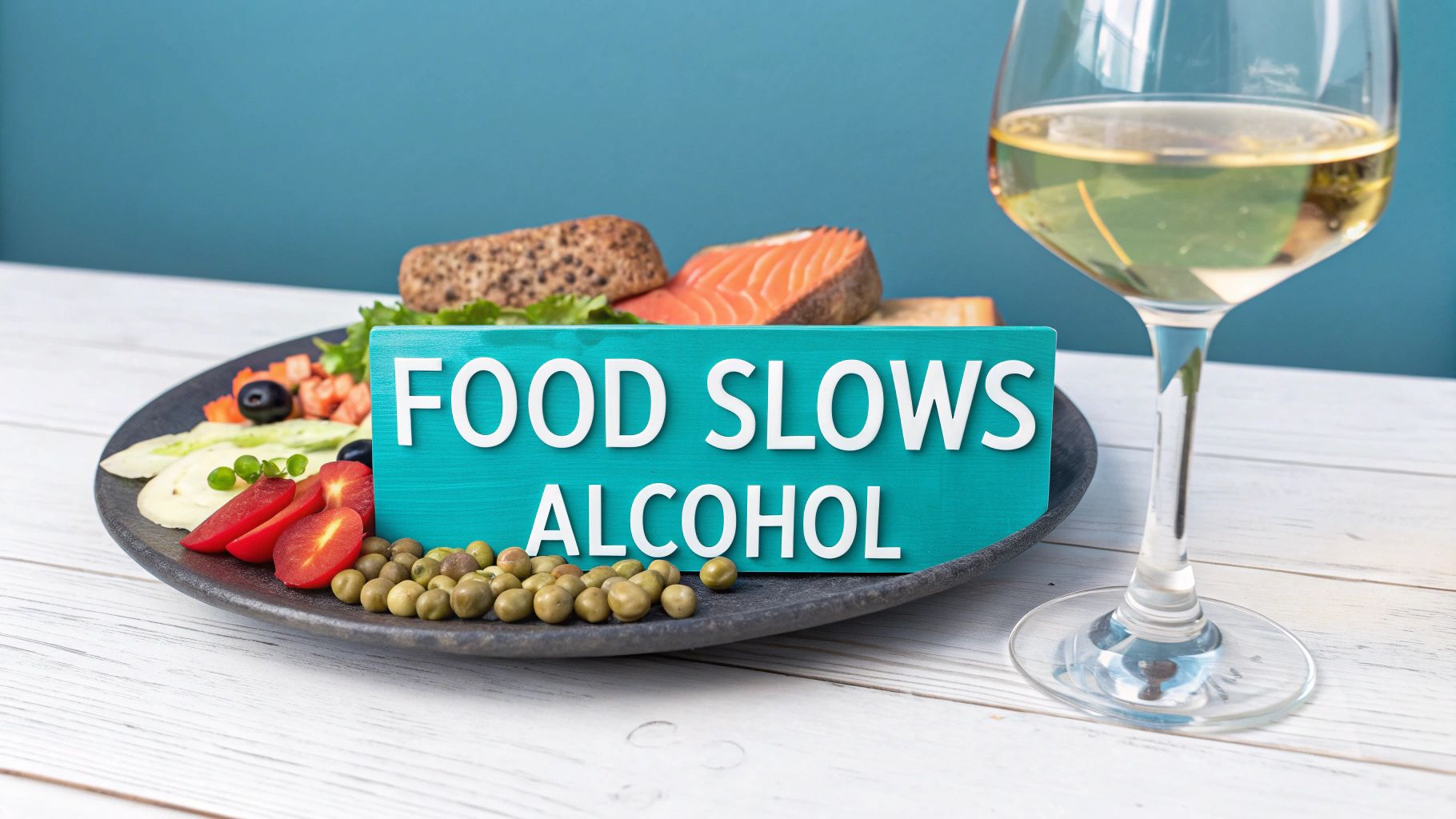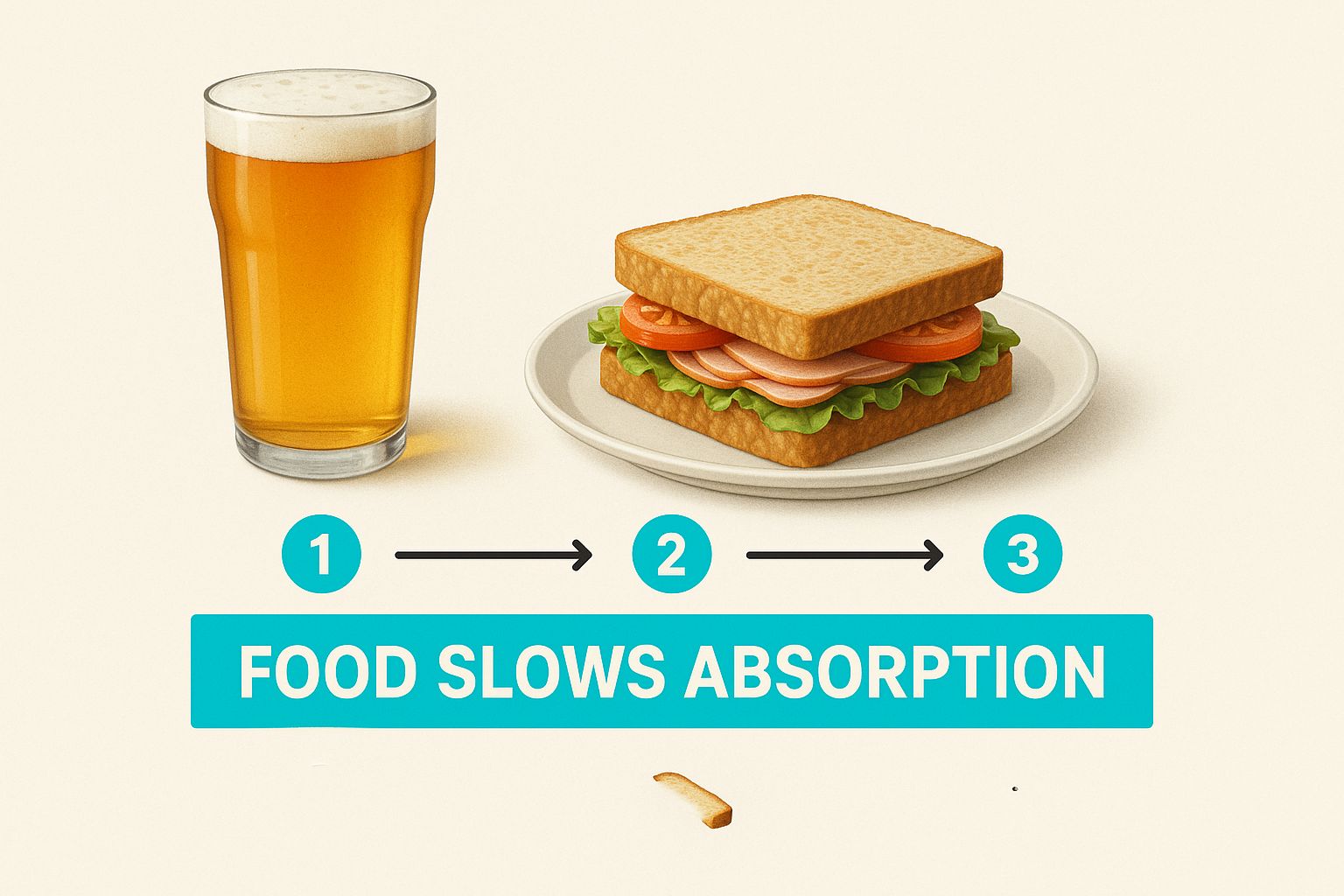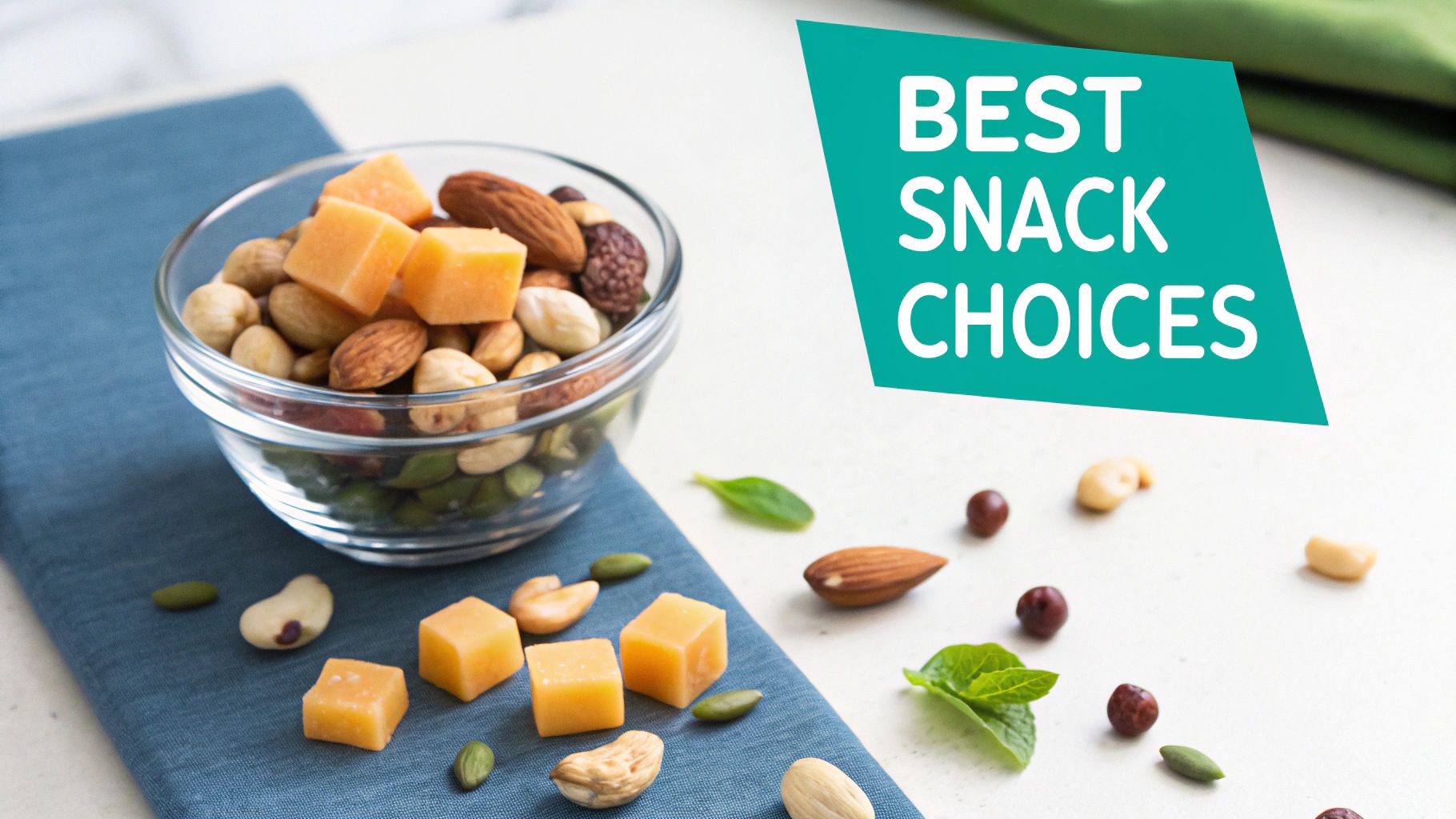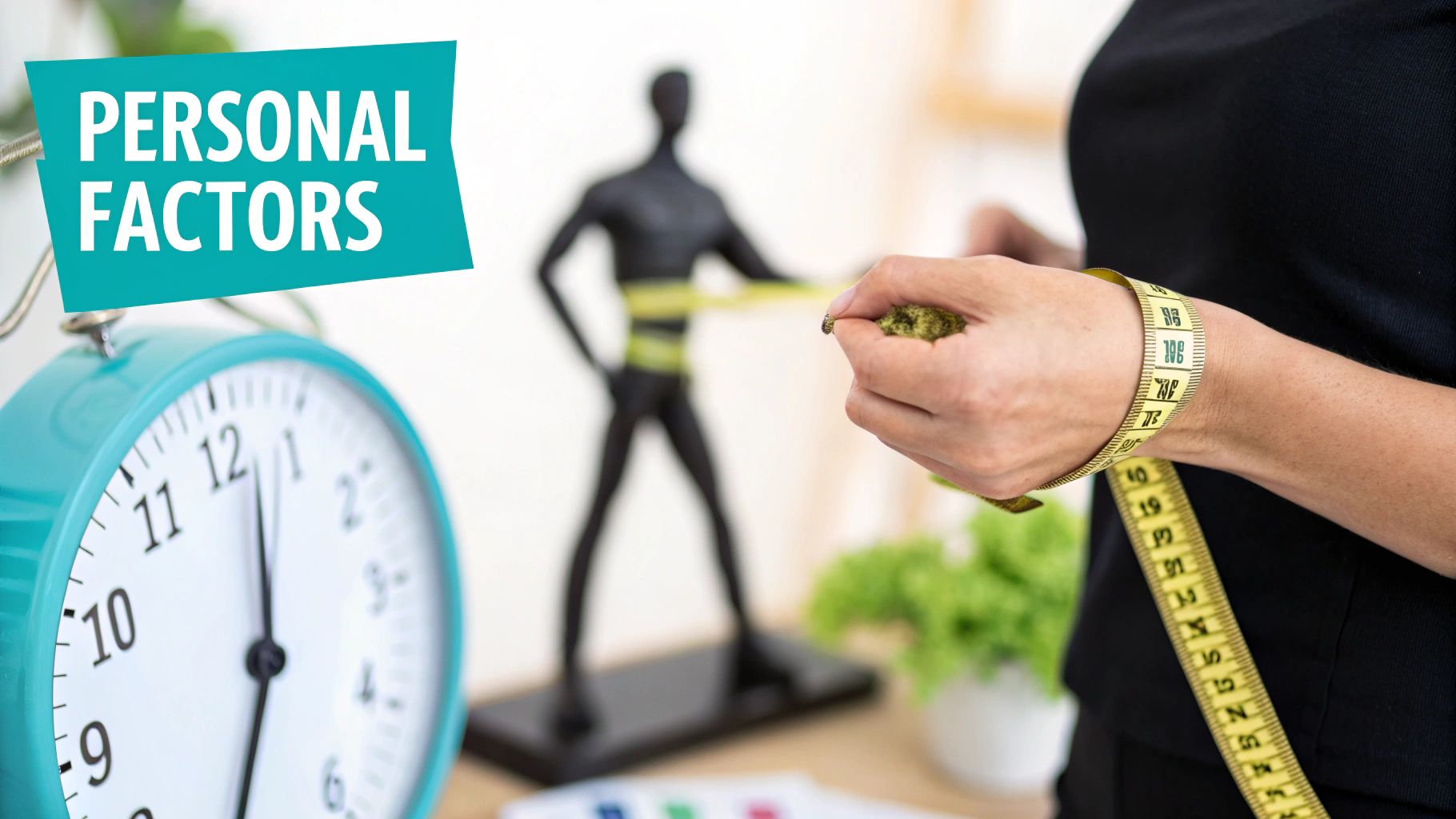

· By Annemarie
Does Food Soak Up Alcohol? The Real Answer
We’ve all heard it: “Get some food in you to soak up the alcohol.” It's one of those classic pieces of advice you get before a night out. But while the image of a big burger acting like a sponge for that glass of wine is a nice thought, it’s not quite how things work.
The truth is, food doesn't "soak up" alcohol. What it does do is way more important—it manages the whole process, slowing everything down so your body isn't totally overwhelmed. A well-timed meal is the single best tool you have to prevent the rapid, intense spike of intoxication you'd feel on an empty stomach.
How Food Manages Alcohol Absorption
Let’s think of your stomach like a bouncer at an exclusive club—the small intestine. When you drink on an empty stomach, there’s no line. The bouncer just waves the alcohol right through. It heads straight into the small intestine, which is where most alcohol gets absorbed into your bloodstream. The result? A fast, intense rise in your blood alcohol concentration (BAC).
Now, imagine you eat a good meal first. Suddenly, the bouncer has a job to do. The food needs to be broken down, so it holds the alcohol back in the stomach for a while.
The gatekeeper here is a muscular valve called the pyloric sphincter. When it’s busy dealing with food, it stays shut longer, creating a bottleneck that keeps alcohol from rushing into the small intestine.
The Science of Slowing Down
This delay is everything. Only a tiny bit of alcohol gets absorbed through your stomach lining; the real party starts in the small intestine. By keeping the alcohol waiting in the stomach, you're essentially putting it on a slow-drip release.
This gives your liver—the body's main processing plant for alcohol—a huge advantage. Instead of getting hit with a sudden flood, it gets a manageable, steady trickle it can actually keep up with. That’s why you feel the effects of your drink more gradually, and with far less intensity, after you’ve eaten.
The difference is massive. Research shows that having a meal before you drink can slash your peak BAC to a quarter or less of what it would be on an empty stomach. That stat alone shows you just how powerful this buffering effect is. If you're curious, you can dig into the physiological effects of food on alcohol absorption to see the full science.
To really see the difference, let’s break down the two scenarios.
How a Meal Changes Your Drink's Journey
This table shows just how differently your body handles a drink depending on whether you've eaten.
| Factor | Drinking on an Empty Stomach | Drinking After a Meal |
|---|---|---|
| Stomach Emptying | Rapid. Alcohol passes through quickly. | Slowed. Food keeps alcohol in the stomach longer. |
| Absorption Speed | Fast. Alcohol floods the small intestine. | Gradual. Alcohol is released slowly. |
| Peak BAC | High and reached quickly. | Significantly lower and delayed. |
| Felt Effects | Intense, rapid onset of intoxication. | Milder, more gradual effects. |
| Liver's Job | Overwhelmed by a sudden surge. | Processes a manageable, steady stream. |
As you can see, a simple meal completely changes the game.
So, does food soak up alcohol? Nope. It does something much smarter. It slows the entire process down, giving your body the time it needs to handle the alcohol safely and efficiently. A good meal isn't just a pre-game ritual; it's your best strategy for a more controlled and enjoyable time.
Your Body's Journey with Alcohol
To really get why eating before you drink makes such a difference, we need to trace the path alcohol takes through your body. It's a quick trip with a few important stops, and each one changes how you feel that glass of wine or cocktail. It's less like a sponge soaking up liquid and more like a carefully controlled release valve.
The second you take a sip, the process starts. A little bit of the alcohol, around 20%, gets absorbed right through your stomach lining and into your bloodstream. But the stomach’s main job here isn't really absorption—it's digestion.
The real action kicks off in the small intestine. This organ is basically built for absorption, making it an express lane to your bloodstream. This is where the other 80% of the alcohol quickly gets into your system. How fast the alcohol gets to this point is the biggest factor in how quickly you feel drunk.
The Gatekeeper Between Your Stomach and Small Intestine
So what's controlling the flow? The main player is a muscular valve called the pyloric sphincter. Think of it as a bouncer at a club, deciding who gets into the small intestine and when.
When your stomach is empty, the bouncer is just chilling. Alcohol can pass right through to the small intestine almost immediately.
But when you eat a meal—especially one with some fat, protein, and fiber—that bouncer gets busy. The stomach has to work on breaking down the food, so the pyloric sphincter clamps down and stays closed longer, holding the alcohol back with the food. This delay is exactly why eating before drinking works so well. It basically creates a traffic jam, stopping a flood of alcohol from hitting your system all at once.
This isn't just a small delay, either. A solid meal can slow down how fast you absorb alcohol for several hours. This gives your liver a steady, manageable stream to deal with instead of a sudden, overwhelming surge.
This infographic shows just how much a simple meal can change alcohol's journey through your body by slowing everything down.

You can see how food acts as a crucial buffer, preventing that rapid spike in your blood alcohol level that you get from drinking on an empty stomach. By keeping the "gate" to the small intestine closed longer, you're giving your body the extra time it needs to process the alcohol way more efficiently.
Choosing The Right Pre-Drinking Meal

Okay, so we know food acts like a traffic controller for alcohol. But knowing that is one thing—choosing the right kind of traffic controller is a whole other ball game.
Not all meals are created equal here. The real goal is to build a balanced meal that gives you a long-lasting buffer against the alcohol hitting you all at once.
The Power Trio: Fats, Proteins, And Carbs
The most effective pre-drinking meals are built on a solid foundation of three key players: healthy fats, lean proteins, and complex carbohydrates. Each one has a specific, vital role in slowing down how fast your body absorbs alcohol. This trio is way more effective than just grabbing a quick, sugary snack on your way out the door.
Think of them as a team working in perfect sync.
Fats are the undisputed champions of slowing down how quickly your stomach empties. Foods packed with healthy fats—like avocado, nuts, or a drizzle of olive oil—signal that little valve at the bottom of your stomach (the pyloric sphincter) to stay shut longer than anything else.
Then you have protein, the sustainer. It provides a substantial, long-lasting presence in your stomach and is just more complex for your body to digest. This helps you feel full and puts the brakes on the whole digestive process.
Finally, complex carbs and fiber add some much-needed bulk to the meal. They mix with the fats and proteins to create a dense, slow-moving mixture that physically gets in the way of alcohol making a quick exit from your stomach.
A well-balanced meal doesn't just ask if food can soak up alcohol; it creates the ideal conditions to manage its effects. This strategy provides a sustained, slow release of alcohol into your system, giving your liver the best possible chance to keep up.
How Macronutrients Help Manage Alcohol
Here's a quick look at how different food types affect the rate of alcohol absorption. This little cheat sheet makes it easy to see why balance is everything.
| Macronutrient | Effectiveness in Slowing Absorption | Examples |
|---|---|---|
| Healthy Fats | Very High | Avocado, nuts, seeds, olive oil, salmon |
| Lean Proteins | High | Chicken breast, fish, tofu, beans, eggs |
| Complex Carbs/Fiber | Moderate to High | Sweet potatoes, quinoa, brown rice, oats |
| Simple Carbs/Sugars | Very Low | White bread, candy, pastries, soda |
As you can see, a meal that combines the top three gives you the most bang for your buck. Simple carbs just don't have the staying power to make a real difference.
Building The Perfect Pre-Drink Plate
So, what does this actually look like in the real world? It's probably easier than you think. Just focus on whole, unprocessed foods that hit those key elements. You want a meal that will stick with you.
Here are a few great examples:
- Grilled Salmon with Roasted Sweet Potatoes: You're getting healthy omega-3 fats and lean protein from the salmon, plus awesome complex carbs from the sweet potatoes.
- Chicken Breast with Quinoa and Avocado: This plate is a triple threat—lean protein from the chicken, fiber-rich carbs from the quinoa, and healthy fats from the avocado.
- A Black Bean Burger on a Whole-Wheat Bun: A fantastic plant-based option that delivers protein and fiber from the beans and complex carbs from the bun.
For a deeper dive, check out our guide on the top 7 best foods to eat before drinking for a better night.
Foods To Skip Before A Night Out
Just as important as what you should eat is what you should definitely avoid. Some foods can actually make things worse.
Highly processed, sugary snacks and simple carbs like white bread or candy get digested in a flash. They offer almost zero buffering effect, leaving your stomach empty and ready to send that drink straight to your bloodstream.
And that greasy, heavy fast food? It might seem like a good idea at the moment, but it can often lead to indigestion and discomfort later on. While the fat content technically helps, the low nutritional value can just leave you feeling sluggish. Sticking to a balanced, nutrient-dense meal is always your best bet.
Why Meal Timing Is Everything
Knowing what foods to eat is a great start, but the real secret weapon in managing alcohol's effects is when you eat. It’s not just about having food in your system, but having it there at the right moment to act as a buffer before the alcohol even shows up. Give your body a head start, and it will thank you later.
The golden rule is pretty straightforward: eat a solid, balanced meal about an hour before your first drink. This is your most effective strategy, hands down. It gets your stomach into full-on digestive mode just in time for the alcohol's grand entrance. Your pyloric sphincter will be closed for business, creating the perfect traffic jam to slow things down right from the get-go.
The Good, Better, Best Framework
Let’s think about your timing strategy in three tiers. They all help to some degree, but one is the clear winner for having a more controlled, enjoyable night.
-
Good: Eating While You Drink. Hey, snacking throughout the night is way better than nothing. It keeps a buffer in your stomach and stops any drinks you have later from hitting you all at once. Think of it as tossing another log on the fire to keep the digestive process chugging along.
-
Better: Eating Right After You Start Drinking. This is basically a game of catch-up. Grabbing a bite will slow down whatever alcohol is still in your stomach, but a good chunk of that first drink has probably already made a run for your small intestine. It helps, but you’ve already missed the chance to create that crucial initial slowdown.
-
Best: Eating a Full Meal Beforehand. This is the undisputed champion. A pre-emptive meal preps your entire digestive system. It makes sure the "gatekeeper" is already on duty, slowing down every drop of alcohol from the second you start sipping. This proactive move gives you the most control over how quickly your blood alcohol level rises.
The whole point here is to prevent a massive, sudden spike in your BAC. Eating beforehand won't stop you from feeling the effects of alcohol entirely, but it stretches out the process. This makes everything far more gradual and manageable, giving your liver a fighting chance to keep up with its job.
At the end of the day, being strategic about when you eat is just as critical as choosing the right foods. Plan your meal before you plan your first drink, and you're setting yourself up for a much safer and more pleasant time. It’s the difference between directing a smooth flow of traffic and trying to untangle an unexpected, overwhelming pile-up.
How Alcohol Influences Your Appetite

When we talk about food and alcohol, the conversation usually revolves around "soaking up" the booze to feel less drunk. But there's another side to this story: how a few drinks can suddenly make you want to eat everything in sight.
Ever noticed that after a cocktail or two, you’re suddenly hit with intense cravings for anything salty, fatty, or carb-loaded? That’s not just a coincidence. It's a real phenomenon, often called the aperitif effect.
Alcohol has a weirdly powerful effect on the part of your brain that controls appetite. It basically sends a false signal to your body that it's starving, even if you just had dinner. What's happening is that the alcohol is firing up the same neurons in your hypothalamus that go wild during actual starvation, creating a very convincing feeling of hunger.
On top of that, drinking messes with the hormones that tell you when you're full. It can dial down leptin, the hormone responsible for signaling "Hey, you're satisfied, stop eating now!" When those hormonal messages get muffled, your brain doesn't get the memo, and that late-night pizza run starts to sound like the best idea you've ever had.
The Science Behind "The Drunchies"
This biological double-whammy is what sets the stage for what many of us know as "the drunchies." Research has actually shown that drinking before or during a meal can make you eat up to 30% more than you would have otherwise.
Combine that appetite-cranking effect with alcohol's famous ability to lower your inhibitions, and you've got a perfect recipe for reaching for high-calorie junk food. This cycle can sneakily add a ton of extra calories to your night—first from the drinks themselves, and then from the food you eat after.
Understanding this connection is a game-changer. It helps you anticipate those cravings instead of being ambushed by them. You can plan ahead, so a fun night out doesn't completely derail your health goals. It’s not just about what you eat before you drink, but also recognizing how drinking changes what you want to eat later.
Managing Alcohol-Fueled Cravings
So, what can you do to stay in the driver's seat? A little bit of planning goes a long way.
- Eat a Real Meal First: Don't go out on an empty stomach. A solid meal with plenty of protein and fiber will keep you feeling full and satisfied, which helps push back against those fake hunger signals from the alcohol.
- Hydrate, Hydrate, Hydrate: Alternating your alcoholic drinks with water is a classic for a reason. It not only slows you down but also helps fill up your stomach, which can stop you from mindless snacking.
- Have a Plan for Later: If you know you're the type to get hungry after a few drinks, have a healthier snack waiting for you at home. This way, you’re not left at the mercy of the nearest greasy takeaway spot.
Being aware of how alcohol affects your body helps you make smarter choices all around. It's not just about avoiding intoxication, but about feeling your best during—and after—your night. Recognizing these patterns is also a big piece of the puzzle in figuring out why you feel so rough the next morning.
To dive deeper into that, check out our guide on what causes hangovers and the science behind them.
Your Blueprint for a Smarter Night Out
Putting all this science into practice is actually pretty simple. While we know food doesn't literally "soak up" alcohol, we can absolutely use it to our advantage to manage how we feel. Think of this as your game plan for a better, more enjoyable night out.
Your Pre-Game Checklist
-
Plan Your Meal Before Your First Drink: This is the golden rule, no exceptions. You’ll want to eat a solid, balanced meal about an hour before you head out. It gives your body a crucial head start.
-
Load Up on Protein and Healthy Fats: Remember how fats are the MVP for slowing down stomach emptying? A meal with something like salmon, avocado, or chicken gives you a much longer-lasting buffer than a simple plate of pasta ever could.
-
Hydrate Relentlessly: Get into the habit of alternating every alcoholic drink with a big glass of water. It's a game-changer. Not only does it keep you hydrated, but it also naturally slows you down and helps you feel fuller, which can keep you from overdoing it.
A smart night out isn’t about restricting yourself—it's just about being prepared. Taking a few simple steps beforehand puts you in control, so you feel better tonight and tomorrow morning.
During and After
-
Keep Snacking (Smartly): If you know it's going to be a long night, having some good snacks on hand can help keep that buffer going. Think nuts, yogurt, or some hummus with whole-grain crackers. Skip the sugary junk food that your body will burn through in minutes.
-
Listen to Your Body: This one is huge. Because food slows everything down, the effects of alcohol can sneak up on you. Be mindful of how you're feeling. Pace yourself and avoid downing drinks just because you don't feel the buzz right away—trust me, it’s coming.
A Few Lingering Questions
Even with the science laid out, a few common questions always pop up. Let's tackle some of the most frequent "what ifs" to make sure you've got the full picture.
What About Drinking Milk Before Going Out?
This is an old classic, and there's some truth to it! Milk has fat and protein, which definitely helps slow down your stomach from emptying its contents into the small intestine. It's a heck of a lot better than drinking on a totally empty stomach.
But let's be real: a glass of milk isn't a substitute for a real meal. Think of it as a small speed bump, whereas a balanced meal with carbs, protein, and healthy fats is like a sturdy roadblock for alcohol absorption.
Can I "Sober Up" by Eating After I'm Already Drunk?
Nope, sorry. Eating after you're already feeling the effects won't turn back the clock. Sobriety is a waiting game—it only happens as your liver works its magic on the alcohol that's already doing laps in your bloodstream.
A late-night meal might slow down the absorption of any booze still left in your stomach, which could keep you from getting even more drunk. But it can’t do anything about the alcohol already in your system. Only time lowers your BAC.
Do Some Drinks Hit You Faster Than Others?
Absolutely. Anything with bubbles—like champagne, sparkling wine, or cocktails mixed with soda—tends to get absorbed quicker. That carbonation can actually increase the pressure in your stomach, which can hustle the alcohol into your small intestine a little faster.
Higher-proof spirits can also pack a quicker punch than lower-alcohol drinks like beer or wine. Understanding these little details, plus nailing your food timing, is a huge part of our guide on how to avoid a hangover and waking up feeling great.
Ready to enjoy your nights without worrying about the next morning? Upside offers a convenient, effective way to counteract hangover symptoms with its easy-to-use jelly sticks. Try Upside today and feel your best.
